CLAY COUNTY, Fla. – Just about every day, for more than a decade, I would see Winton Carter on his daily walk down the street in our Clay County neighborhood, or returning home from somewhere in his pickup truck.
Through the grapevine, I had heard he was nearing 100 years old. Honestly, I was just amazed he's still driving.
My amazement of Mr. Carter quadrupled when I finally heeded my husband's advice, after his many conversations with our neighbor.
"Joy, he has a great story to tell," my husband said of the retired Marine and World War II veteran.
I learned Mr. Carter -- known as "Sarge" to his friends -- will celebrate his 100th birthday this fall, but what he has sacrificed for our nation is worth celebrating now.
New comrades, old memories
"So where do you go every morning, Mr. Carter?" I asked because I just had to know after watching him climb into his pickup truck every day for years.
He invited me to join him for breakfast with the perfect breakfast companions; three local military veterans who range in age from 73 to 80.
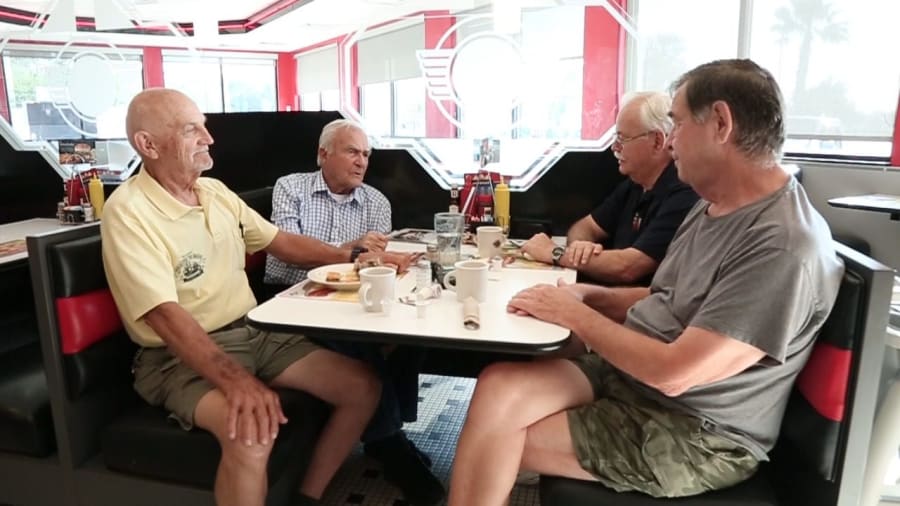
One is a former marine, another a former sailor of the U.S. Navy, and the third a former soldier in the U.S. Army.
They love joking around with Sarge, teasing him about someday finding a girlfriend.
"She's been dead about 12 years," Carter said matter-of-factly.
He's referencing the love of his life, Norma Jean, who died in their home back in 2007 from cancer. They had been married for 60 years.
He met his bride in Albany, Georgia in the fall of 1946. He was on recruiting duty for the Marines. She was an office worker for the Army on the floor above his. After meeting her mother the day of their first date, he says he and Norma Jean were inseparable.
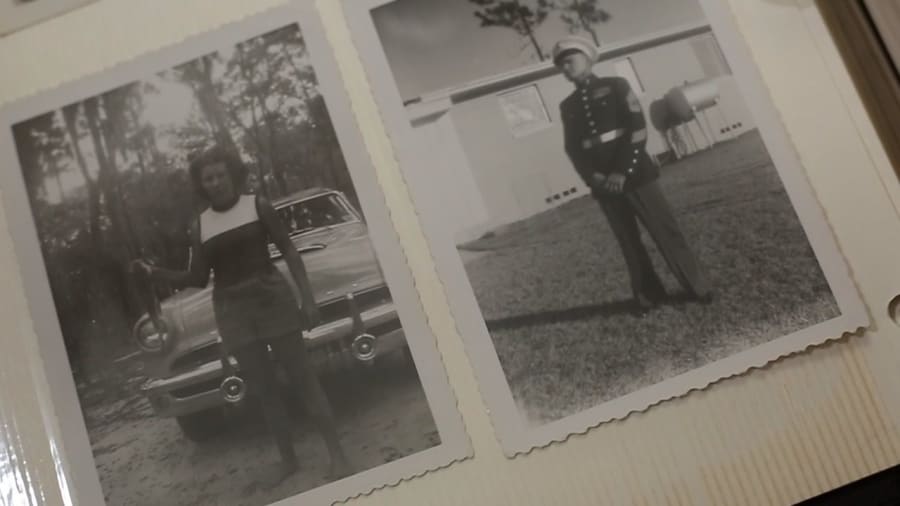
"We had a long courtship, about two months," he said to his friends, pausing and waiting for everyone at the table to get his joke. They tied the knot about a year after some of his darkest days during World War II.
Carter's start in World War II
Carter said he was guarding the Canal Zone (we now call the Panama Canal) in 1941, when -- while sitting in a bar with his buddies December 7th -- the Navy's military police rushed in.
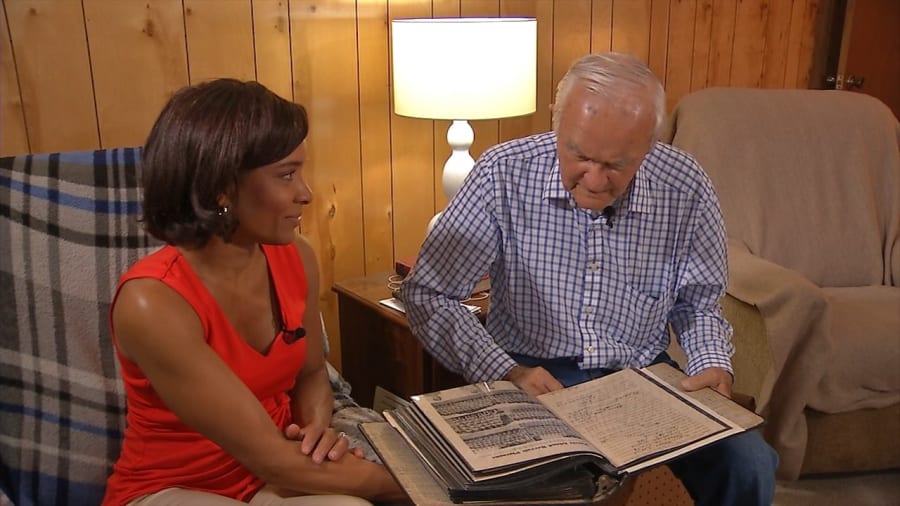
"He banged on the table with his club and says, 'Hey guys! You have to get back to the base right away, The Japanese have bombed Pearl/Harbor!'" Carter recalled.
"Where is Pearl Harbor? We had no idea where Pearl Harbor was," Carter explained with the same look of confusion he gave the military police announcing the tragedy.
Carter would go on to see some of the fiercest fighting in the Pacific Theater.
Dealing with death
My jaw dropped to hear some of the horrific images seen by the neighbor I knew as a gentle grandfather figure, always smiling with a strong love for life.
Carter's facial expression changed to that of the hardened uniformed Marine he had just showed me in old photos that seem to come from a different lifetime.
His stories focused on his fight in the Japanese islands of Guadalcanal, Saipan, and Iwo Jima, which included watching comrades killed right next to him. One image -- he says -- he's never forgotten.
"I was trudging along at one point, and I saw a guy's head laying right there. No body, just, just a head," Carter said while showing no emotion. "I didn't stop. I just looked at it and went on."
I must have had a look of terror on my face, because he tried to explain his blunt recollections.
"After a few days, you see so many events and so many corpses," he stated. "It's like going through a watermelon patch. You don't pay attention to it."
Respect for the enemy's dead
Carter went on to describe being aboard an amphibious tractor and seeing dozens of "women's and young people's bodies" floating in the water near a cliff on the North end of Saipan.
He said he learned later that the women were told by the Japanese it was better for them to commit suicide rather than endure -- what the Japanese claimed -- the Americans would do to them.
"I'm about to run over a dead woman with a baby in her arms, and I yelled at the guy, 'Put on the brakes!'" he said, remembering the panic he felt knowing the amphibious tractor he was on would cremate her body if she were run over.
"He stopped and (the tractor) bumped into her and just pushed her to the side," he said, pausing and getting lost in his own memories. "She committed suicide with her baby in her arms."
Carter's Purple Heart
Saipan is also where Carter was wounded in battle and later received his Purple Heart. Japanese fire, he told me, had hit his amphibious tractor head-on.
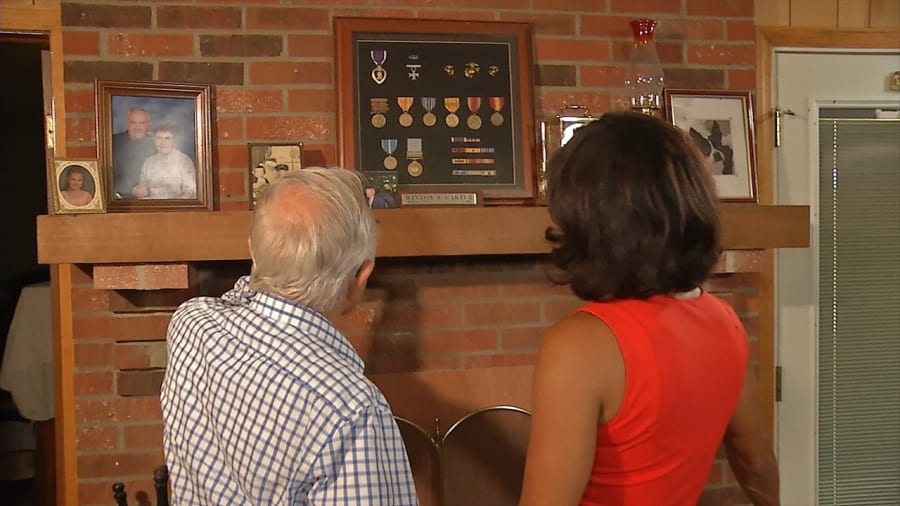
"Killed the driver and the radioman," he told us, pointing at each man's position on the tractor.
"One of the guys down below had most of his foot shot off, and I got a hunk of shrapnel right there," he said while grabbing the back of his thigh.
After the blast, he said he reached down to feel his leg still there, so he kept fighting. It wasn't until two days later during a stop at a makeshift bathroom that he saw puss running down the back of my leg and quickly visited the infirmary.
"I had to have it cut out," he said of the painful experience. "I can hardly find the scar anymore. It's been a long time."
U.S. Flag raised during the Battle of Iwo Jima
The combat veteran's memories have not faded, like the details he shared about this one time on the Japanese island of Iwo Jima.
Carter told me he was retrieving a case of cigarettes for his comrades.
"Someone said, 'Hey look! They're raising a flag," he said of the historically famous scene showing a group of U.S. Marines raising the American flag on the island.
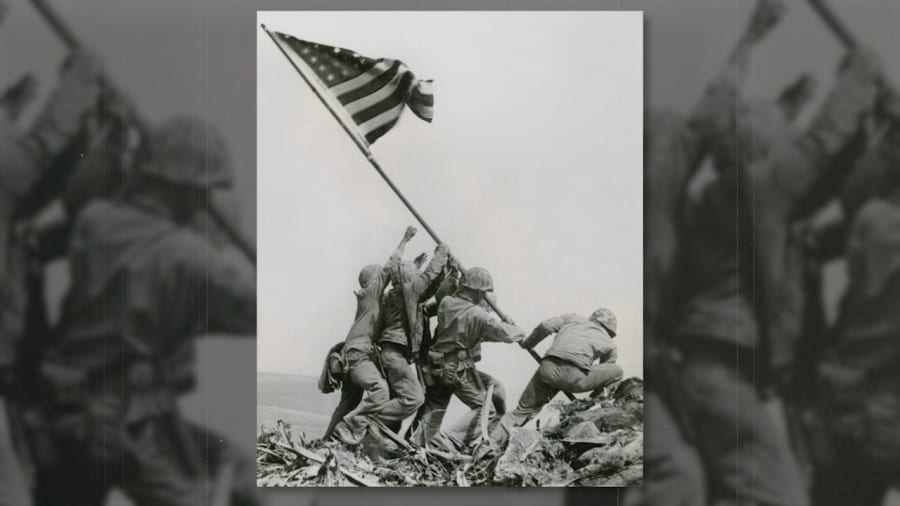
"It means more to me now that it did then because I looked at it and thought, 'We do that at every island. So what?'"
Carter then laughed at his own reaction, knowing he was there for the moment that would symbolize -- for so many -- the Pacific victories of World War II.
He was among the first Marines to land on Iwo Jima. He said he and thousands of other American fighters found themselves under surprise attack when the Japanese burrowed underground like ants, and then suddenly sprang up all over the island to fight some of the bloodiest battles of the Pacific Theater.
While sitting with Carter, captivated by his stories for nearly an hour, I quickly realized how he was able to deal with the death and destruction he witnessed throughout the war.
After war, Carter "met God"
Any negative emotions Carter felt from all the heart-wrenching horror of war seemed to have been buried with his military brothers on the islands where they took their last breaths.
WATCH: Winton "Sarge" Carter's uncut interview about war and more
An experience for him later in life -- one that does evoke his emotions and brings back the happy-go-lucky neighbor I know -- is how he said he met God.
“I never really knew how to pray,” he explained of his relationship with God during war times. “But I sure learned how to pray fast!” he chuckled.
Carter's demeanor changed to a more serious, you’re-never-going-to-believe-this-one tone as he explained the moment he says he became a Christian about 20 years ago.
"I was driving and stopped at a stop sign, and someone got into the truck with me!" he said, describing the sudden feeling of a person sitting in the empty passenger's seat next to him.
"It happened again the next day, in the same spot," he said, recalling his own surprise. "I knew exactly what I was supposed to do."
"I went home and told Norma Jean, 'We have to find a church. I just met God!'
He told me that was the answer to his wife's years-long prayers.
Carter credits God every chance he gets, including for his own 99 years on earth.
"The Lord didn't give us that privilege of knowing when (we'd die)," he said with a comforting smile while sitting with his military buddies at breakfast. "I don't think we would want to know anyway, 'cause we would start going the other way!" he laughed heartily.
Everyone at the table understood that joke.




